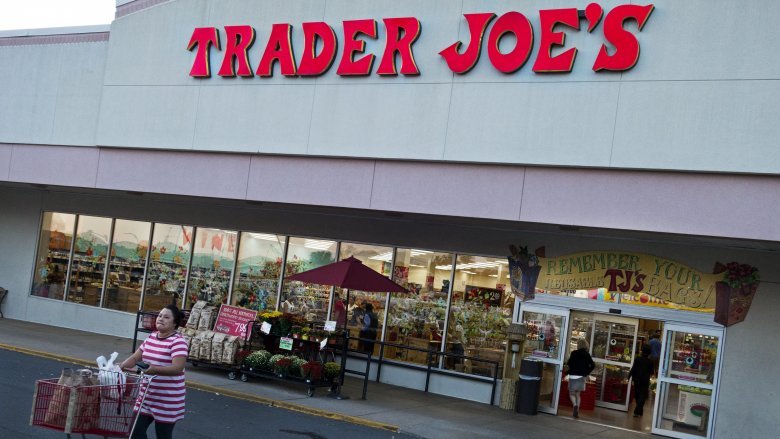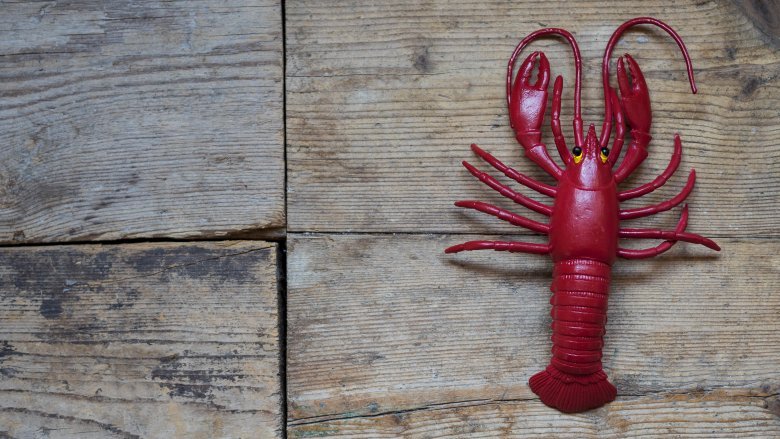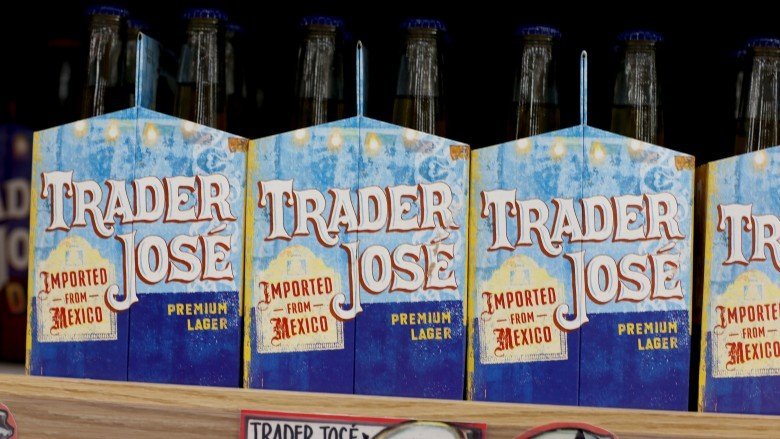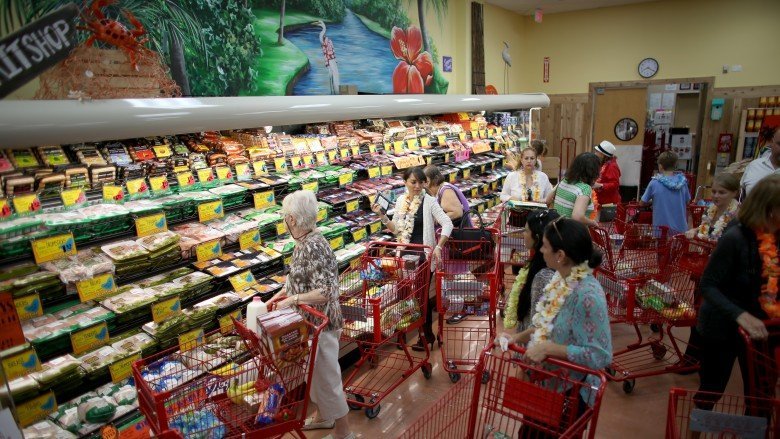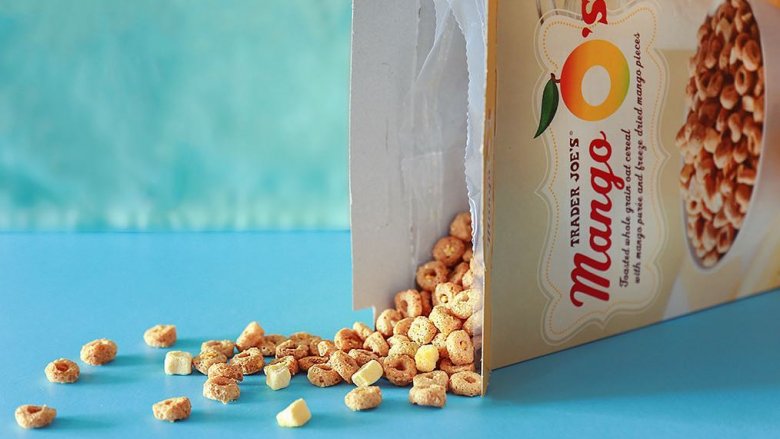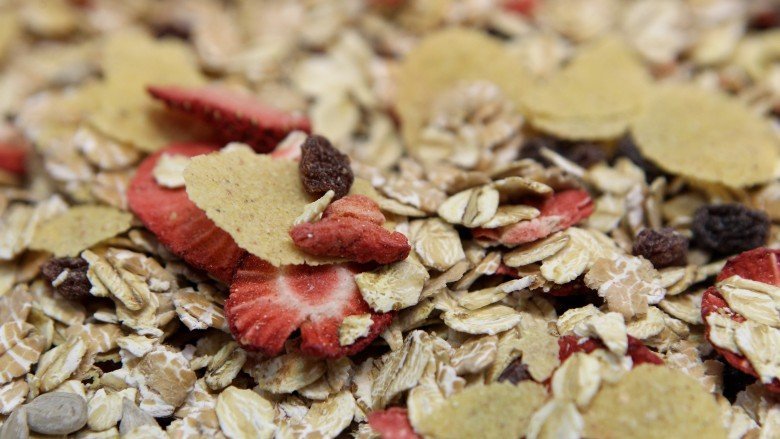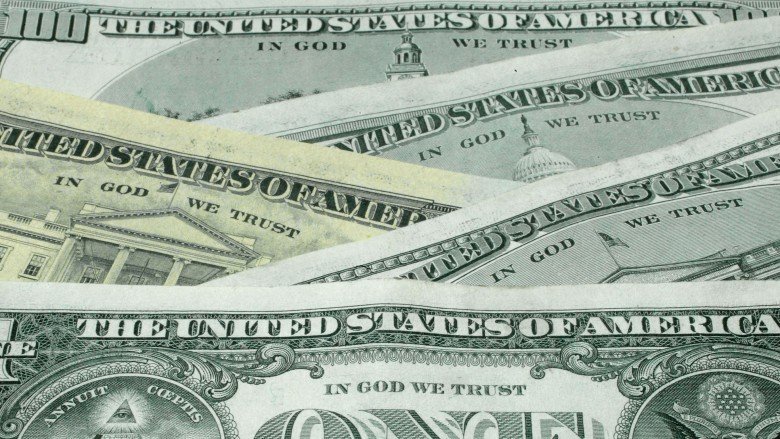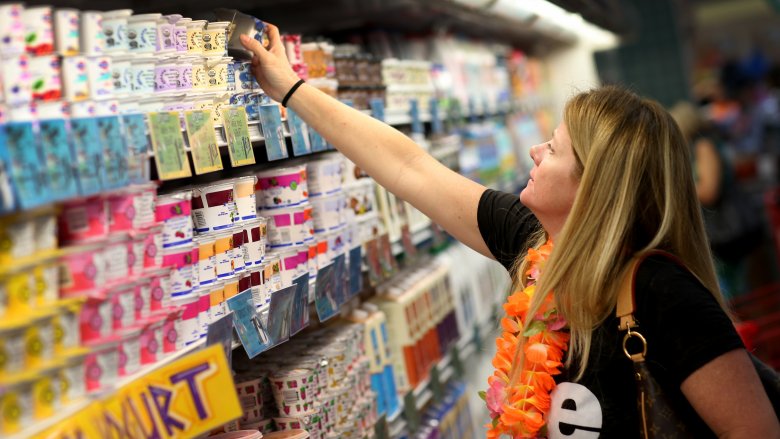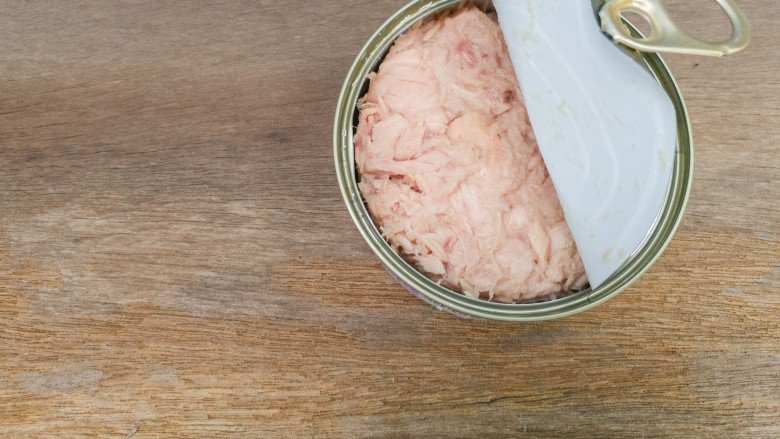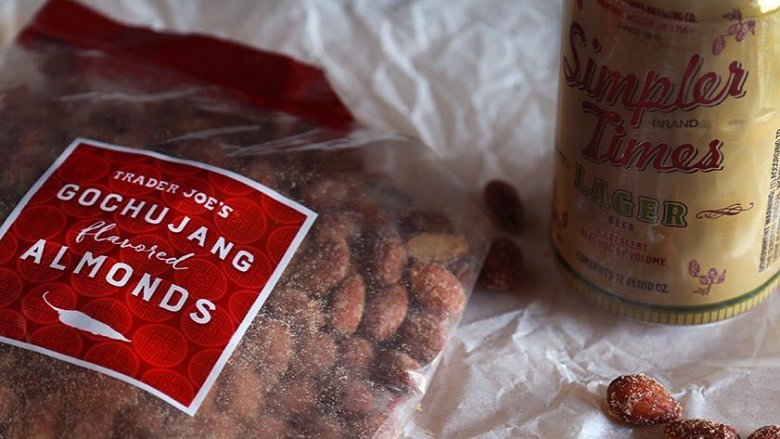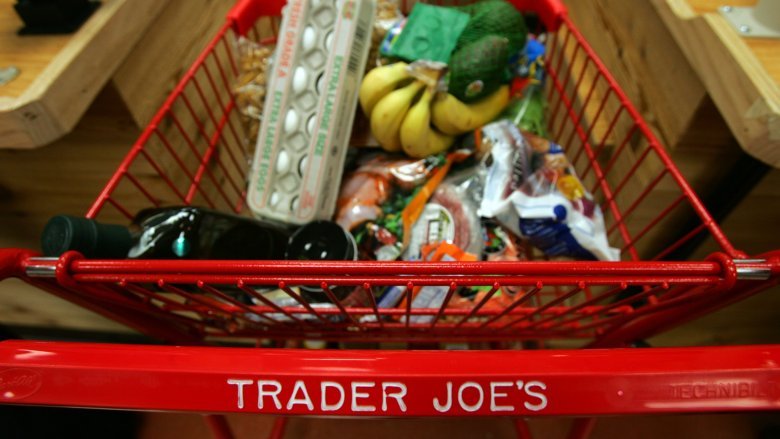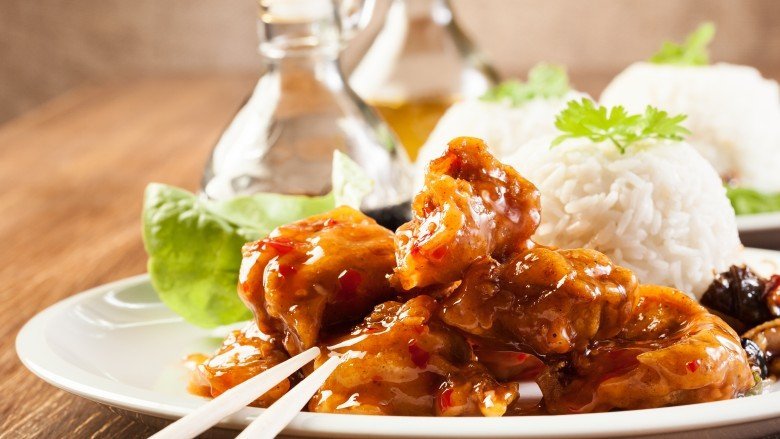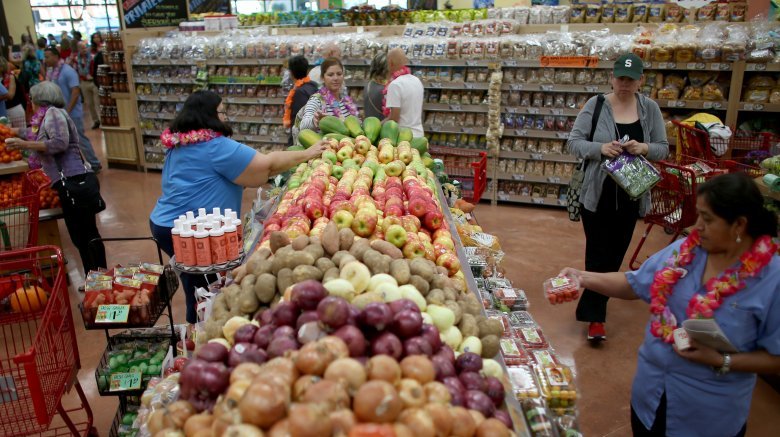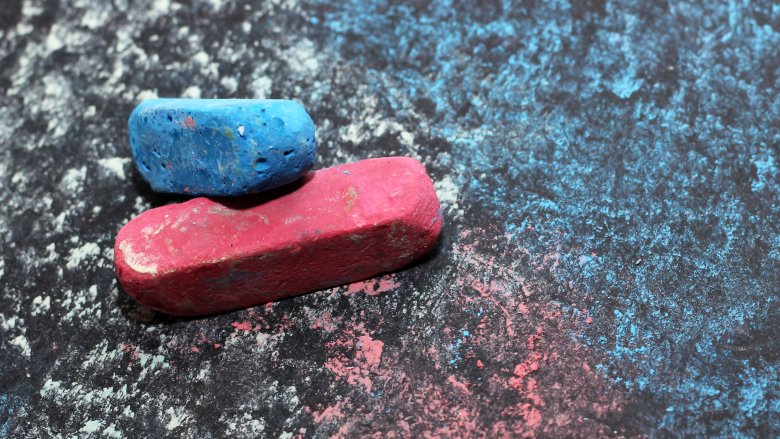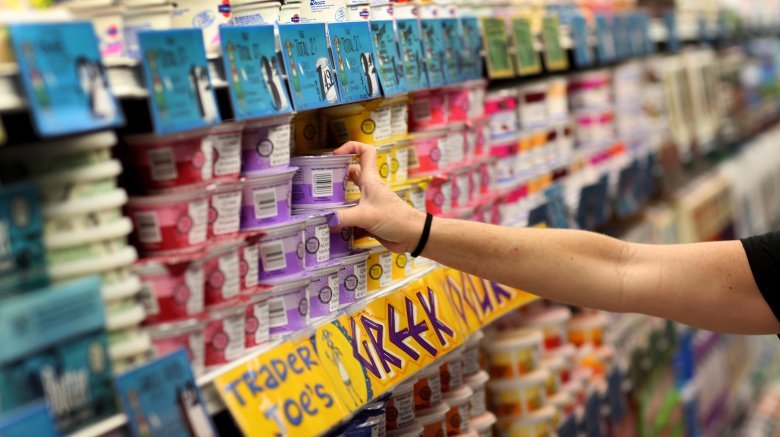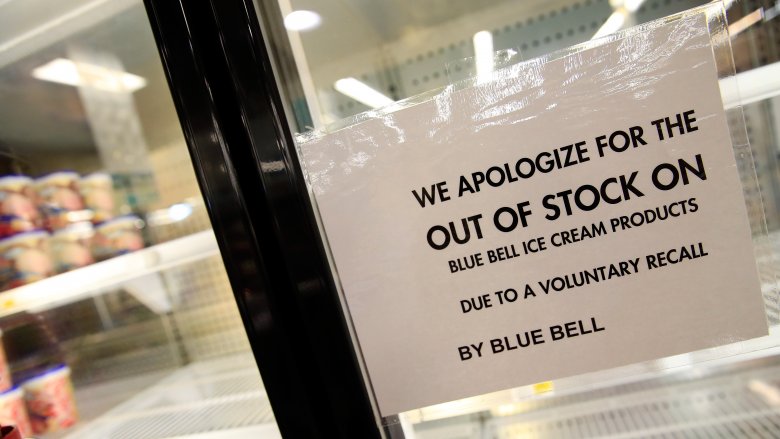What You Need To Know Before Shopping At Trader Joe's
Some people go to church every Sunday, but I make a weekly pilgrimage to my local Trader Joe's. If you're a frequent shopper at Trader Joe's, you know that the parking lot on Sunday can best be described as a modern-day, vehicular version of an ancient Roman orgy, but like most Trader Joe's customers, my stress somehow goes away when I place some coconut oil in my cart, along with a bottle of Two Buck Chuck, and a box of Peppermint Joe-Joe's. Without a doubt, if you live near a Trader Joe's, you've probably been there a few times, but there's a lot you might not know about the quirky place that sells everything from cookie butter to cooked lobster.
It wasn't always called Trader Joe's
Today, everyone knows the name Traders Joe's, but once upon a time, the store went by a completely different moniker. Trader Joe founder Joe Coulombe helped open a chain of small convenience stores called Pronto Markets, and decided to buy them in 1958. It wasn't until 1967 that he decided to change the name to Trader Joe's. Believe it or not, they also made the stores bigger during that transition.
There's always a hidden lobster
Need something to keep the kids busy while you do your shopping? Send them on a hunt for the hidden lobster! Plastic lobsters were brought into the store as a fun way to decorate in 1976 — they went well with the bright Hawaiian shirts — but since 1983, every single location has had a plastic lobster hidden somewhere within the store.
You can return anything, no questions asked
Remember the infamous tire return tale from Nordstrom? Well, you might not be able to bring back old tires, because TJ's never sold them, but the company has an equally amazing return policy. It doesn't matter if it's a half-eaten frozen dinner, a box of tea, or a can of Simpler Times lager that had a sip taken from it, Trader Joe's will happily take it back with no receipt required.
If you do have your receipt, you can expect a full cash refund; unless it's alcohol and you live in a state where it's illegal to get cash back on beer and wine purchases. If you're a person who throws receipts away as fast as you get them, you'll receive a gift card to use at the store for whatever the lowest advertised price was for the item.
Living near one boosts your property value
Back in 2015, the folks at RealtyTrac compiled data from zip codes that have a Trader Joe's and those that have a Whole Foods. Their results showed that homeowners who have a TJ's as their neighbor see an astonishing 40 percent increase in their property value from the time they purchased as opposed to only a 34 percent increase for those homes near a Whole Foods.
However, you might have to ditch the good wine and go for the Two Buck Chuck more often if you live near Trader Joe's, because property taxes average around $8,536, which is 59 percent more than if you lived near their rival.
Trader Joe's employees ring bells because they don't have an intercom system
What are those loud ringing bells in between Sarah McLachlan's "Building a Mystery" while you're doing your grocery shopping? It's actually the way employees communicate with each other. Because Trader Joe's is always busy and they don't have an intercom system, the bells are secret employee code.
A former TJ's employee told Thrillist, "...instead of asking for so and so to come to the front, one bell [ring] calls for one of us to come up and help the register. Response time is quicker — you get more people coming up."
Big brands probably make their generic products
The vast majority of Trader Joe's products are not from big name brands like Amy's Kitchen or Earthbound Farm, but rather are labeled as the generic store brand. But Trader Joe's doesn't have a manufacturing plant, so who's out there making all of those products? TJ's is very secretive about this, but rumor has it that they source these products from big name brands who manufacture and package it for them, and a taste test conducted by SFGate suggests at least some of the rumors might be true. That would explain why their macaroni and cheese tastes a lot like Annie's, or why their water crackers taste just like Carr's. Of course they wouldn't want consumers to know this — certainly Annie's wouldn't want it revealed that you can get the same product for less money, so it's doubtful if it will ever be confirmed. It's extremely plausible, though.
Two Buck Chuck is basically Franzia in a bottle
When you think of Trader Joe's, the first thing that pops in your head is cheap booze, specifically their Charles Shaw line of wines known by the nickname, Two Buck Chuck. Do you have friends who routinely dismiss Franzia boxed wine, yet claim that Two Buck Chuck isn't bad for the price? It's time to call them out, because it's basically the same exact product.
Charles Shaw is a brand under the Bronco Wine Company; which is like the Coca-Cola of wine in regards to production and brands they own. The CEO of Bronco is Fred Franzia (Yes, that Franzia). What makes it so cheap though? Bronco Wine Company cuts corners by using inexpensive corks, thin glass, fermenting the wine using cheap oak chips instead of barrels, and mass harvesting grapes using machinery.
The first Trader Joe's product was granola
Trader Joe's was formed in 1967 by Joe Coulombe in Pasadena, California, but it wasn't until 1972 when they launched their first private label product, a simple granola. It was the '70s after all.
Trader Joe's still sells their own granola, and practically everything else under their own brand. An astonishing 90 percent of the items sold at Trader Joe's are in-house labeled products, compared to a paltry 20 percent at other grocery stores. Because they don't carry a lot of name brand items, they're able to sell at a deep discount.
The parking lots are not small on purpose
Even in paradise there can be problems, and for Trader Joe's customers, the biggest problem are the always-cramped parking lots. Donald Shoup, an expert in transportation and a "rock star" when it comes to studying the design of parking lots told City Lab that the parking lots at Trader Joe's are completely sufficient, Americans are simply just used to big box stores with acres and acres of free parking available. Trader Joe's is much smaller than your local "super center" type store, so they provide the required amount of parking in accordance to the size of their location to keep costs down. However, Trader Joe's is extremely popular, thus their parking lot is always jammed. To put it in perspective, TJ's sells an astonishing $1,734 per square foot. Twice as much as rival Whole Foods, which has bigger locations.
They pay their employees well
In an age where workers are demanding to increase the minimum wage in order to make ends meet, Trader Joe's, like Costco, are leading the movement when it comes to paying their employees a decent salary and treating them well. According to the The Huffington Post, those just starting at the grocery store average around $13 per hour. Trader Joe's also gives their employees paid sick leave and offers vision and dental insurance to all employees who clock in 15 or more hours per week.
Have you ever met an unfriendly person who was working at Trader Joe's? Unlike other retail stores, where you're lucky if an employee acknowledges you, TJ's employees are upbeat and for the most part are happy to work there.
They overstaff
It's well known that customer service is pretty exceptional at Trader Joe's, which makes sense with how well their employees are compensated. But they have another tactic that ensures you're always able to get the help you need: They overstaff. By doing so, they encourage their employees to interact with customers — something they might do less of if they were overburdened with stocking or cleaning duties. That completely changes the employee-customer dynamic, and makes it so you're not wandering around the store lost like you might at big box stores.
Trader Joe's was hit with a lawsuit over tuna fish
Like Subway who was sued because they were bragging about the actual size of their footlongs, Trader Joe's came under fire over not giving customers enough tuna fish. In the lawsuit that was filed in January, 2016, 5-ounce cans of tuna fish sold at Trader Joe's were tested by the U.S. National Oceanic and Atmospheric Administration and every can came up short. Trader Joe's tuna on average only has 2.43 ounces, which is under the federally mandated minimum of 3.23 ounces. The lawsuit was filed to make food producers and retailers pay up for short-changing customers.
Employees get to test the food
Ever wonder how TJ's employees always seem so knowledgeable about all of their products? Certainly having an employee discount encourages their employees to shop there, in turn familiarizing them with the stock, but that's not all they do to keep their staff so informed. They also encourage them to try all of the new products, going so far as having an employee prepare the foods, and making them available in the break room, free of charge. This allows staffers to form their own opinions about products instead of reciting from a corporate script, or simply telling customers that everything is delicious.
Their name is a promise
If a product in their store is labeled with a Trader Joe's brand, it means more than you might think. In order to bear that name, a product has to do a lot more than taste good. Trader Joe's private label products are always free of artificial flavors, colors, preservatives, MSG, genetically modified ingredients and artificial trans-fats. Since 80 to 90 percent of products sold in Trader Joe's stores bear one of their private label names, that's a pretty big deal.
Trader Joe's Mandarin Orange Chicken is a customer favorite
For eight years, Trader Joe's has done an annual Customer Choice Awards where TJ's loyalists submit what their favorite products are. For 2016, the yummy and always delicious Cookie Butter was dethroned and replaced by Mandarin Orange Chicken — a frozen dish that tastes a million times better than anything served at a mall food court.
Don't worry Cookie Butter fans, the sweet spread is still a fan favorite, but it dropped to the second spot. Joe's Diner Mac 'n Cheese, Triple Ginger Snaps, and Pound Plus 72 percent Dark Chocolate round out the top five.
Produce problem
Trader Joe's excels in some areas, like their variety of nuts and their affordable meats and fish. One area that's lacking, however, is their produce selection, which has several different problems. For one, produce often softens, shrivels, or otherwise ages before its sell-by date, so these sad fruits and vegetables end up being passed over and languishing on the shelves. To be fair they don't use rinses or sprays on their organic produce, but the problem is not limited to the organic section. Additionally, Trader Joe's often packages their fresh produce with Styrofoam and plastic wrap. I'm sure there's a reason they do this, such as ease of distribution, but packaging fresh fruits and vegetables in this manner is off-putting for folks concerned with the environment.
Every store has an artist
Have you ever noticed how the signs at Trader Joe's are often changing, or that each store has its own unique artistry? That's because each store has its own, in-house sign artist creating and designing the signage around the store. And while the Store Captain determines the overall culture of a store (though they're all nautical-themed), the sign artist — or in some cases, artists — has a lot of creative input.
There are few if any other grocery stores that spend the money to hire artists in this manner, instead adhering to corporate-designed themes for a uniform brand. But it seems to work for TJ's, who continue to invest in its artists, relying on them to make sure stores have a neighborhood feel.
There's a Canadian bootlegger
Have you ever heard of Pirate Joe's? No, Trader Joe does not have a seafaring, swashbuckling brother. Rather, Pirate Joe's is "an unaffiliated unauthorized re-seller of Trader Joe's products" in Canada, catering to Canadians who can't make the trek to the states, but still want Trader Joe's items. Since Trader Joe's doesn't have stores in Canada, Pirate Joe's is the only game in town. In a nutshell, they go to Trader Joe's stores in the states, buy a ton of stuff, legally bring it across the Canadian border, and re-sell it at a mark-up that Canadians happily pay.
Unsurprisingly, Trader Joe's is not happy about this arrangement, and banned Mike Hallatt, the man behind the operation, from their stores. He got around it somewhat by wearing disguises and hiring people to shop for him. But Trader Joe's also sued him, and after spending approximately $75,000 in legal fees, he agreed to close the store. But the website is back up, and says, "we were sued, they lost, they appealed, they won, we are fighting." What happens next is anyone's guess.
There've been a lot of recalls
People have been griping about the volume of recalls that Trader Joe's has issued for years now, concerned as to why there always seem to be so many. And according to their website, it does seem like there's been an awful lot of them, many for their own house brand. There were four recalls for TJ's branded products in October and November of 2017 alone: one for possible glass or plastic in poultry salads, one for possible listeria in dips and sauces, one for possible listeria in slaws and salads, and one for possible listeria in a salad blend. Previous recalls in 2017 have been issued for undeclared ingredients in sausage, possible metal in ice cream, and possible plastic in breakfast burritos.
Even though this volume of recalls might sound alarming, it's not as bad as it may sound. That's because companies are doing as much as they can to prevent their brand from becoming associated with foodborne illnesses and allergy attacks, and these recalls help stop potentially tainted food from ever reaching your table. And even though it's expensive and not great for business to recall products, for companies, the fallout from sickening or killing customers is much, much worse.
